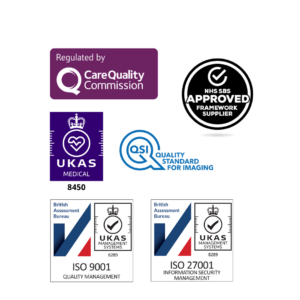The benefits of injections in adults with hip osteoarthritis
A paper recently appeared in the British Medical Journal (BMJ) comparing the effectiveness of a single steroid and local anaesthetic joint injection to usual advice in adults with hip osteoarthritis.
Paskins et al. studied 199 adults aged over 40 with arthritis of the hip who were experiencing moderate degrees of pain. Sixty-seven were randomly allocated to receive standard education and advice. Sixty-six were given an ultrasound-guided steroid and local anaesthetic injection (a common procedure that is undertaken routinely at Medical Imaging Partnership).
They then followed the patients over six months, assessing their pain using a self-reported pain score from 0 to 10. The results showed that those who had the injection overall experienced less pain throughout the six months follow up period.
The ultrasound was also able to detect inflammation or fluid in the joint, signs of active arthritis, and these patients experienced more significant benefits.
It was noted that those who received both the steroid and local anaesthetic had their pain score halved at two weeks with an average improvement of 25% at six months.
One of the key measures in any clinical trial is how many patients need to receive the treatment for one to benefit. In this study, the number was encouragingly low. Just two patients needed to receive the treatment for one patient to have their sleep restored; three patients treated for one to feel better, and three treated for one patient to have returned to no limits on their usual activities.
Clearly then, an ultrasound-guided steroid and local anaesthetic injection is a beneficial treatment for patients with arthritic joint pain. It isn’t, however, for everyone and it’s important that orthopaedic specialists carefully assess those patients who would be suitable and explain any possible risks, such as infection. Each patient must be carefully assessed and counselled, however, the risks are low and the benefits significant.
The effects of gluten in our diet
Another paper in the BMJ concerned the effects of gluten in our diet. Lebwohl et al. undertook a study to determine if gluten is related to heart disease. Gluten-free diets are now increasingly common amongst those who do not have coeliac disease and are seen by many as a healthy dietary option.
Lebwohl studied just over 64,000 individuals involved in the Nurses’ Health Study and 45,000 men in the Health Professionals follow up study. These individuals were free of heart disease when they enrolled in the studies in 1986, and they were subsequently followed up every four years, including a dietary questionnaire.
Over the 26 year follow up period, 2431 women and 4098 men developed heart disease. After adjusting for other risk factors between the two groups, the team found no increased risk of heart disease the those who consumed gluten in their diet.
The study thus confirmed that gluten is not related to heart disease. However, they advised that avoiding dietary gluten in those who do not have coeliac disease could lead to increased cardiovascular risk. Such a diet may reduce the consumption of beneficial whole grains that reduce cardiovascular risk.
The impact of a healthy lifestyle on life expectancy with and without Alzheimer’s dementia
Next to an interesting paper by Dhana et al. in this week’s BMJ. The nub of this study was to determine if adopting a healthy lifestyle would lead to increased life expectancy with a reduction in the possible years that an individual may suffer from Alzheimer’s.
They studied just over 2400 men and women aged 65 years and older. They assessed the individual’s lifestyles using a standard tool to look at five modifiable lifestyle factors: such as diet, alcohol consumption and exercise.
They found that women aged 65 and over with four or five healthy lifestyle factors had an average life expectancy of 24 years. This was three years longer than those with none or only one beneficial lifestyle factors.
The group with four or five health factors spent on average 2.6 years of their remaining years suffering from Alzheimer’s. In contrast, the group with non or one factor spent an average of 4.1 years suffering from Alzheimer’s.
The figures for men were very similar. Men with four or five healthy factors had an avenge life expectancy of 23 years which was 5.7 years longer than those with none or one health factor. Those with four or five factors spent an average of 1.4 years with Alzheimer’s and the unhealthy group an average of 2.1 years.
The results were pretty clear in that a healthy lifestyle leads to a longer life and reduces the possible number of years that an individual may suffer from Alzheimer’s dementia.
Are moderate amounts of alcohol good for you?
Time to slay one of the myths of healthcare; that small or moderate amounts of alcohol are good for you.
Over recent years there’s been a lot of evidence to disprove this, and most current guidelines advise that there is no safe limit of alcohol for your health. But why has this myth that small or moderate amounts are good for you persisted? In a recent paper in the Journal of The American Medical Association, JAMA the conclusions were that maybe this is due to those who consume ‘small’ amounts of alcohol tend to have healthier lifestyles and it’s the general healthier lifestyles that lead us to falsely conclude that the small amount of alcohol is good for them. It’s not; it’s the other factor such as their diet and exercise.
Hepatitis outbreak in children
Finally, to something you may have picked up recently in the news and that has recently been discussed in New Scientist. There’s recently been an outbreak of hepatitis in children. The numbers are small, two hundred in total worldwide, with half the cases in the UK. Hepatitis means inflammation of the liver and can have many causes, from viruses such as Hepatitis A which is picked up from food poisoning to Hepatitis C, another virus that was passed on in the 80s and 90s via infected blood transfusions. In addition, drugs and certain diseases can also cause hepatitis.
Why this small outbreak in children has happened is far from clear. The prime suspect is an adenovirus known as 41F. This has been found in some of the children and would typically just cause stomach bug like symptoms, so why has this now changed to cause hepatitis symptoms?
One hypothesis is that this may be related to lockdown. During lockdowns, children were not exposed to the usual viral infections they encountered and thus had little immune stimulation. However, once we came out of lockdown, the children were once more exposed to all those common viruses in the community. In some children, this may have led to an overreaction of the immune system to the adenovirus and thus led the children to develop hepatitis.
There is a long way to go yet before we finally name the cause of this small outbreak, but it is an interesting hypothesis and, if correct, has significant implications for future isolations.
That’s all for now, folks
Thanks for your time.
 OUR BLOG
OUR BLOG

 Paul Zollinger-Read CBE
Paul Zollinger-Read CBE




